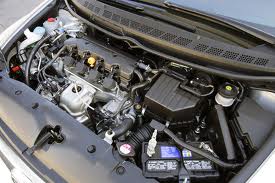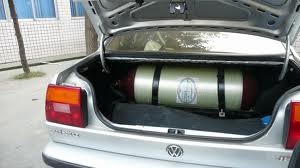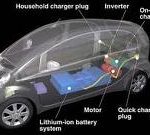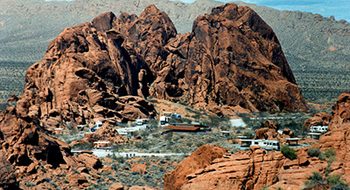
By Bob Difley
While the national average price of gasoline is now reaching for $4.00, some residents of Utah are happily filling up on compressed natural gas (CNG) at $0.63 per gallon–the country’s lowest price for CNG. There are an estimated 150,000 Natural Gas Vehicles (NGVs) on America’s highways according to the Natural Gas Vehicle Assn. (NGVA) and only about 1500 CNG refueling stations–about as many as there are stations that carry E85 ethanol blends. Even in Utah there are only 20 open to the public.
The NGVA also says there are 50 different manufacturers producing 150 models of light, medium and heavy-duty vehicles and engines that run on compressed natural gas, but, there is only one–the Honda Civic GX (photo)–that is available to individuals and it’s only offered in California and New York (although Utah could be next on the list). California ranks highest in number of CNG refueling stations, but fuel prices are also higher—closer to $2.50 per gallon.
The good news–for Honda, anyway–is that there is so much demand in Utah for CNG-ready vehicles that Honda can’t make them fast enough. However, you don’t have to wait in line for a Honda. You can convert a used vehicle to run on natural gas, and for either used or new vehicles, the tax incentives are substantial. Combining state and federal tax credits in Utah can almost completely offset the approximately $7,000 difference in price between regular and CNG-ready vehicles.
Compressed natural gas is touted as the “cleanest burning” alternative fuel available. The big question in Utah is whether or not the infrastructure can keep up with the number of new CNG cars on the road. Utah already has 5,000 CNG vehicles, up from none a few years ago, and they are overwhelming the refueling network.
 Then, of course, there’s the question of natural gas supply. Supposedly, there are huge natural gas resources on public lands in the U.S., including areas a hundred miles or more off the coast of Florida, the east and west coasts, and in the Rocky Mountain area. The current jump in oil and natural gas prices is increasing political pressure to allow domestic gas exploration and production.
Then, of course, there’s the question of natural gas supply. Supposedly, there are huge natural gas resources on public lands in the U.S., including areas a hundred miles or more off the coast of Florida, the east and west coasts, and in the Rocky Mountain area. The current jump in oil and natural gas prices is increasing political pressure to allow domestic gas exploration and production.
An alternative is bio-methane gas, resulting from the natural breakdown of plant material, something already captured by landfills in the US. The NGVA says that waste biomass could supply enough natural gas for about 11 million natural gas vehicles, which is approximately 5% of the nation’s automotive fleet.
According to GreenCar.com, “the cost to convert to CNG can range from about $12,500 to $22,500 depending on the vehicle, engine, size of CNG tanks needed, and who does the converting. The greatest expense is for the CNG tanks, and the more capacity and number of tanks, the more expensive the conversion.” That’ll make a dent in your wallet.
Tax credits, rebates, and other incentives can offset some of the cost of a conversion, but it wouldn’t work unless you kept the car long enough to offset the expense. For example, the federal Energy Policy Act of 2005 includes an income tax credit that offsets 50 to 80 percent of the incremental cost of purchasing a new dedicated NGV. It applies to the cost of converting an existing vehicle with an EPA- or CARB-certified retrofit system. In addition, there may be state tax credits. Home CNG refueling devices may qualify for additional federal and state tax incentives as well.
Like electric vehicles, CNG vehicles appear to be a bit far away before they become practical for RVers, unless you do all your RVing in Utah. However, CNG as a fuel for an RV seems to be a bit closer to practical than electric or hybrid. Demand would have to perk up, gas prices continue to rise, the media to jump on a CNG bandwagon, drivers start to damand more public CNG availability, the extraction process of hydrofracking will have to overcome the environmental problems, and there would have to be a big increase in CNG infrastructure for it to happen. And, of course, Boone Pickens will have to keep investing in gas wells and promoting CNG. But it is a sensible step between oil and electric for fueling America’s vehicles and getting us off foreign oil.
Check out my website for RVing tips and destinations and for my ebooks, BOONDOCKING: Finding the Perfect Campsite on America’s Public Lands, Snowbird Guide to Boondocking in the Southwestern Deserts, and 111 Ways to Get the Biggest Bang out of your RV Lifestyle Dollar.



Road Worthy Certificate Victoria
A family member referred me to your website. Thanks for the details.
G Shea
The past several weeks I have been driving CNG buses to a local CNG station for fueling and have seen a huge variety of vehicles using CNG, far more than I had imagined before. Examples follow; Garbage trucks, hotel shuttles, Chevy, Ford and Honda taxis, small uhaul type trucks, and more. The fuel at the station is 1.89 per gallon. The taxis driver’s confirmed that they average 80 mpg. My math says that not only is CNG practical, but a real threat to the domination of gas/diesel. If we only import 1/3 of our oil I would think CNG and electric could put a huge dent in our needs for foreign oil.
G. Shea
G Shea
I read many of folks talking theory on CNG on this blog. I think it is time for more facts and less theory. The facts I site come from direct experience with CNG as a part of my job driving cars and buses powered by CNG.
1. The transit agency I drive for has cars and trucks converted to CNG and they get DOUBLE the mileage compared their gas/diesel counterparts. Our Ford Taurus gets 70 mpg!
2. Cost for a gallon of natural gas is less than 80 cents
3. Range for these vehicles is the same as for “traditional” fuels. Overall weights change little for modified vehicles.
4. Our buses have been using CNG for over a decade and with massive savings in cost, and pollution.
5. Motor homes are often bus chassis and could be factory built to use CNG with little or no change in retail prices.
6. Massive amounts of CNG are available domestically (estimates are 200 years worth ), and it heats homes and powers vehicles all over our country and has for decades.
7. Transit Agencies and huge fleets of all types of vehicles have been using CNG for decades now and have proven it as a excellent fuel for cost, and the environment.
We may not be able to completely solve problem of sending US dollars to folks who despise us, if CNG and electric are used to reduce our demand, we could increase jobs, reduce pollution, reduce funds to hostile sources, and most importantly save on costs! The RV industry should offer CNG as a option and let RV driver’s discover the fuels benefits as well.
G. Shea
Larry
I wouldn’t burn natural gas at all. You lose a ton of horsepower and your MPG would drop considerably. Propane has way more BTU’s, but you would still need a monster engine to equal what you get with gasoline. Changing over involves more weight to haul around in the form of the tank itself and the tank will have to be significatly larger to hold enough LPG or Propane to equal the range gotten with gasoline. All this stuff has been tried in the past and found wanting. There isn’t much out there that hasn’t been tried at one time or another and nothing can beat or even come close to gasoline or diesel for milege per gallon and torque per gallon. Like I said above, if you want to get the same distance per tank of whatever to gasoline or diesel, you’re going to have to have a monster tank and if you want to have the comparable horsepower and torque, then you’re going to have to have a monster engine, which adds to the weight of fuel and tank to hold it. To me, the price of the change over is prohibitative, especially on a 45 foot motorhome (which I don’t have, btw). I think it would take years of driving to pay back 22,000 dollars. It’s the same as it was when the gas crunch first came along. People who had a paid for gas guzzler traded it for a small high GPM car….and had all those payments to deal with. I’m not casting any aspersions, but it is said that a fool and his/her money is soon parted. It’s sort of on a par with “a person who is their is own lawyer has a fool for a client”…..
David T.
In addition to my comment above I would like to see many others do what I did when the uprising in Egypt was instrumental in our current oil fiasco. I sent emails to the news anchors of each of the networks and asked them to start pushing the need to become completely independent of foreign oil. Numbers count! We will continue to develope alternative energy sources but will be using oil for many years to come.
David T.
Manuel,I agree with you 100%. THE SOONER THE BETTER!!!!!
Manuel Enos
This is all well and good but for the time being this progressive agenda adminstration needs to get off its collective butts and open up our vast resources of untapped oil. If you believe we have none then you are buying into the green machine. You have to walk before you can run so we need to up our own oil production and work on all these alternative ways to fuel our vehicles and the economy. Let the spotted owl and the caribou deal with it – we are not destroying their habitat as some would have you believe. DRILL HERE, DRILL NOW and get off Muslim Oil!!
G Shea
I have driven CNG buses for years and the transit agency I work for uses CNG for several reasons. It is far better for the environment than gas or diesel (yes it produces methane but in rather small amounts compared to CO2 from traditional fuels) One decent volcano dumps years worth of these into the air each eruption without paying a carbon fee (grin).
It costs our agency around 70 cents per gallon and our converted Ford Taurus gets around 70mpg meaning we get double the mileage we would otherwise, making CNG very cost effective. Our maintenance costs are slightly higher since CNG burns hotter and special plugs and filters are required. Our Taurus has very similar maintenance costs to an unaltered vehicle. I suggest not that CNG replace gas or diesel, but if we convert a decent percentage of our vehicles in the US to it, (motor homes and big rigs?) we could massively reduce our dependence on foreign oil, and bring down the costs for all fuels until electric and hydrogen can be fully developed. We have tons of CNG right here in the US and I feel it is time we use it.
G Shea
Motorhome Guy
In the UK diesel is currently over $10 a gallon (at $1.60 per GB pound). I know that we don’t have as far to go and our vehicles are generally smaller but look over here for a vision of the future. It is costing over $100 just to fill up a small automobile.
We call CNG LPG (liquid petroleum gas) and it is currently around $5 a gallon. There’s over 1000 stations around the country but adoption is slow and a conversion is most popular for 2nd hand V8 petrol SUVs like Range Rovers that do 15 miles per gallon. The Government used to give a grant towards the cost of conversion, not sure if they still do.
butterbean carpenter
Howdy Guru Bob,
I had the pleasure of driving 72 passenger school buses powered by CNG, back in the early 80s… Riding along with what looked like a bomb strapped under you wasn’t a good feeling.. It was exposed to the elements and in a precarious position in case of a side hit collision… BUT it must be okay as there have not been any explosions and they’re still running those buses!!! As far as less power, I couldn’t tell any difference, except when pulling away at a stop it was a little slower.. On the highway it would still break the speed limit (tho’ I never did it) !!! I’m not in that area any longer or I’d try to get an update on the longevity of the buses..
The tank in the Honda looks a lot better protected than the ones on the buses!!!
Smooth roads & balmy breezes!!!
Howard
Interesting article. I think Honda makes a device which looks a little like a scuba tank compressor that will fill your CNG vehicle from the same piped in natural gas source that fuels the furnace and water heater in many urban homes. Great for commuters.
Big Bubba the 98 Safari
Bob, thanks for the article. We are hearing lots of buzz lately about CNG as a replacement for gasoline and diesel.
Another positive for CNG, I am told, is reduced maintenance costs. Much longer oil change intervals and greatly reduced wear on engine components because it burns much more cleanly than gasoline or diesel fuels could also offset some of the cost.
BUT, CNG gives much less power per gallon than diesel. I think it is around 60%, so that must be factored into the costs. At $1 a gallon for CNG and $4 for diesel, it effectively reduces the cost of the diesel to $2.40. At $2.50 a gallon for CNG, it is a wash.
Other environmental factors come into play, too. CNG emits methane, which is much more harmful as a greenhouse gas than CO2. Perhaps this byproduct can be reduced or mitigated in some way.
Simple solutions don’t seem to be easy to find.
Lee Ensminger
Bob, I didn’t see anything about the number of BTU’s in CNG. I don’t know the exact numbers, but there are fewer in a gallon of CNG than in gasoline, correct? That would mean carrying more fuel for the same distance and resulting in fewer MPG, which needs to be figured into the final costs. Interested to hear a response from someone who knows all the numbers. Also, what about engine power output? Not critical in automobiles, but more important in RV’s where we often use full power on grades. Thanks for an interesting blog!
Bob Difley
Thanks for the update, Steve. I would like to see CNG happen, but there is not enough press or public demand behind it yet. I can see the cost of conversions coming down as demand and competition increase, and according to news sources there is still much more supply than demand which should keep prices low. And with the difference between $1 for CNG and $4 for gasoline, every 2,500 miles (@ 25mpg) you would save roughly $300 in fuel costs. On a converted RV getting 10mpg you would save $750. With tax credits and other incentives, payback would not take a lifetime.
Steve
great news piece … however, some of your facts are wrong. I have a few friends with CNG vehicles (I live in Utah). The cost is over $1 .. see this site: http://www.cngprices.com/
And I know of some conversions that have cost around $5,000. That plus the tax credits make it very affordable. When gas went up to $4 a few years ago, many conversions happened. Now that it is going up again, I suspect a new push will be happening here in Utah for conversions.